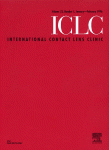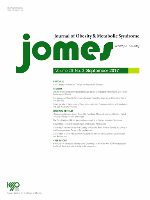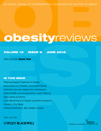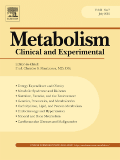
Obesity
Scope & Guideline
Illuminating the Path to Better Health Outcomes
Introduction
Aims and Scopes
- Epidemiology and Public Health:
Research examining the prevalence, risk factors, and public health implications of obesity, focusing on demographic variations and societal impacts. - Clinical Interventions and Treatments:
Studies assessing the effectiveness of various interventions, including pharmacological treatments, surgical options, and lifestyle modifications for obesity management. - Metabolic and Physiological Mechanisms:
Investigations into the underlying biological and metabolic pathways contributing to obesity, including genetic, hormonal, and microbiome influences. - Psychosocial Aspects of Obesity:
Research on the psychological, behavioral, and social dimensions of obesity, including weight bias, mental health associations, and the impact of lifestyle factors. - Childhood and Developmental Obesity:
Focus on the origins of obesity in childhood, including prenatal influences, dietary patterns, and long-term health outcomes. - Obesity-Related Comorbidities:
Studies exploring the relationship between obesity and various comorbid conditions, such as cardiovascular disease, diabetes, and certain cancers.
Trending and Emerging
- Integration of Technology in Obesity Management:
There is an increasing emphasis on the use of technology, such as mobile health applications and telemedicine, to support obesity treatment and management. - Microbiome Research:
Studies investigating the role of gut microbiota in obesity and metabolic health are gaining traction, highlighting the complex interactions between diet, microbiome, and obesity. - Socioeconomic and Environmental Influences:
Research exploring the impact of socioeconomic factors and built environments on obesity prevalence and management is becoming more prominent. - Precision Medicine Approaches:
Emerging themes focus on personalized obesity treatment strategies, taking into account genetic, metabolic, and individual lifestyle factors for tailored interventions. - Longitudinal Studies on Weight Trajectories:
There is a growing interest in longitudinal studies that track weight changes over time, providing insights into the long-term effects of interventions and lifestyle changes. - Mental Health and Obesity Interconnections:
Increasing recognition of the complex relationships between mental health disorders and obesity is leading to more studies examining dual approaches to treatment.
Declining or Waning
- Traditional Dietary Interventions:
Research focusing solely on conventional dietary approaches, such as calorie restriction, appears to be less prevalent, as newer studies emphasize holistic and integrative approaches to obesity management. - Sole Focus on BMI as a Metric:
There is a noticeable shift away from exclusively using BMI as a measure of obesity, with increasing emphasis on body composition and metabolic health indicators. - Obesity Stigma Studies:
While still relevant, investigations specifically centered on obesity stigma may be seeing a decrease in frequency, as studies increasingly incorporate broader psychosocial aspects. - Pharmaceutical Approaches Without Lifestyle Integration:
Research that examines pharmacological interventions in isolation, without considering lifestyle modifications, is declining, reflecting a growing recognition of the need for comprehensive treatment strategies. - Obesity in Non-Clinical Populations:
There seems to be a waning interest in studies focusing on obesity solely within non-clinical populations, with a trend towards examining clinical outcomes and interventions.
Similar Journals

OBESITY SURGERY
Redefining the Landscape of Obesity SurgeryOBESITY SURGERY is a premier academic journal published by Springer, focusing on the critical and evolving fields of Endocrinology, Nutrition, Surgery, and Metabolism. Since its inception in 1991, the journal has become a vital resource for researchers, clinicians, and healthcare providers dedicated to understanding and advancing bariatric surgical techniques and the management of obesity-related conditions. With an impressive Impact Factor and an HIndex signifying its significant contribution to the scientific community, OBESITY SURGERY has achieved a prestigious ranking in the Q1 category across multiple disciplines, including Endocrinology, Diabetes and Metabolism, Nutrition and Dietetics, and Surgery. Our dedicated team is committed to publishing high-quality research that informs best practices and enhances patient outcomes. Although this journal operates on a subscription model, its comprehensive scope invites a diverse readership that includes both seasoned academics and emerging scholars. Located in the United States, at One New York Plaza, the journal aims to continue shaping the discourse around obesity treatment and prevention well into 2024 and beyond.

Obesity Science & Practice
Fostering Collaboration for Evidence-Based Health SolutionsObesity Science & Practice is a prestigious, peer-reviewed journal dedicated to advancing knowledge and research in the fields of obesity, endocrinology, diabetes, metabolism, and nutrition. Published by Wiley, this journal has established itself as a vital resource for researchers, healthcare professionals, and students interested in the latest evidence-based practices and innovations in obesity management. With an impact factor that reflects its significance, and ranked in the Q2 category for both Endocrinology, Diabetes and Metabolism, and Nutrition and Dietetics in 2023, the journal aims to foster interdisciplinary collaboration and dissemination of cutting-edge research. Since its transition to Open Access in 2015, Obesity Science & Practice has become increasingly accessible, emphasizing the importance of making research findings available to a wider audience. This convergence of expertise and commitment to public health makes the journal an essential forum for advancing scholarship and practice in tackling widespread global health challenges.

INTERNATIONAL JOURNAL OF OBESITY
Pioneering Insights in Endocrinology and NutritionINTERNATIONAL JOURNAL OF OBESITY, published by SpringerNature, stands as a premier multidisciplinary platform for research in the fields of Endocrinology, Diabetes and Metabolism, Nutrition and Dietetics, as well as Miscellaneous Medicine. With a remarkable impact, the journal is consistently positioned in the Q1 category across these critical areas, underscoring its significance in advancing the understanding of obesity and its related health outcomes. Established in 1977 and covering a broad spectrum of studies until 2024, it boasts a notable Scopus Rank reflecting its influential contributions to the scientific community, including a rank of 14 out of 140 in Nutrition and Dietetics. The INTERNATIONAL JOURNAL OF OBESITY is not just a repository of knowledge but a vital resource for researchers, clinicians, and students aiming to explore the complexities of obesity and develop evidence-based interventions. Despite not being an open-access journal, its rigorous peer-reviewed articles remain accessible to those within academic institutions, facilitating an essential dialogue among professionals dedicated to this critical global health issue.

AMERICAN JOURNAL OF PHYSIOLOGY-ENDOCRINOLOGY AND METABOLISM
Transforming understanding in endocrinology and metabolism.American Journal of Physiology-Endocrinology and Metabolism, published by the American Physiological Society, stands as a leading platform for disseminating high-quality research in the fields of endocrinology, diabetes, and metabolism, as well as general physiology. With an impressive impact factor placing it within the Q1 category across multiple relevant disciplines (Endocrinology, Diabetes and Metabolism; Physiology; and Medical Physiology), this journal reflects its authoritative position in the scientific community. Spanning from 1980 to 2024, the journal consistently publishes groundbreaking studies and significant findings that advance our understanding of hormonal regulation and metabolic processes. Although it does not currently offer open access, it provides valuable resources for researchers, professionals, and students alike, eager to stay at the forefront of advancements in physiological sciences. Addressed in Rockville, Maryland, its commitment to excellence and rigorous peer review ensures that every article contributes essential insights to the field.

Arquivos Brasileiros de Cardiologia
Championing the fight against cardiovascular diseases with quality research.Arquivos Brasileiros de Cardiologia is a leading open-access journal dedicated to advancing the field of cardiology and cardiovascular medicine. Established in 1950 and published by the ARQUIVOS BRASILEIROS CARDIOLOGIA, this Brazilian journal plays a crucial role in disseminating high-quality research that addresses both emerging and established topics in cardiovascular science. With an impressive history and a commitment to open access since 1997, it provides researchers, healthcare professionals, and students with free and readily available content that significantly contributes to the understanding and management of cardiovascular diseases. The journal is indexed in Scopus and holds a Q3 ranking in the category of Cardiology and Cardiovascular Medicine, demonstrating its relevance and participation within the global research community. Researchers can submit their work and access a wealth of information that spans a variety of subfields, reflecting the journal’s dedication to fostering innovation and collaboration within cardiology. With a mailing address at Avenida Marechal Câmara, 160-330 Centro, Rio de Janeiro, RJ 20,020-907, Brazil, the journal continues to serve as a vital platform for scholarly communication and knowledge exchange in the cardiovascular realm.

Obesity Research & Clinical Practice
Championing Multidisciplinary Approaches to ObesityObesity Research & Clinical Practice is an esteemed journal published by ELSEVIER SCI LTD, focusing on cutting-edge research and clinical practices related to obesity and its multifaceted impact on health and wellness. With an ISSN of 1871-403X and an E-ISSN of 1878-0318, this journal serves as a vital resource for researchers and practitioners in the fields of Endocrinology, Diabetes and Metabolism and Nutrition and Dietetics. Notably, it holds a Q2 ranking in Endocrinology, Diabetes and Metabolism and a prestigious Q1 ranking in Nutrition and Dietetics for 2023, reflecting its influence and quality within the scientific community. The journal features a broad scope of research topics encompassing clinical findings, epidemiological studies, and therapeutic advancements in obesity treatment, aiming to improve health outcomes globally. Submissions are encouraged from diverse disciplines, ensuring a dynamic and multidisciplinary approach to tackling obesity-related challenges. Given its convergence of years from 2007 to 2024, Obesity Research & Clinical Practice stands as a prominent platform for disseminating valuable knowledge, insights, and groundbreaking research in this pressing area of public health.

Journal of Obesity & Metabolic Syndrome
Championing Open Access for Groundbreaking ResearchThe Journal of Obesity & Metabolic Syndrome, published by the Korean Society for the Study of Obesity, is a premier, open access journal that has been championing research in the realms of endocrinology, diabetes, and metabolism since its inception in 2012. With an ISSN of 2508-6235 and an E-ISSN of 2508-7576, this journal has quickly established itself as a leading publication, currently ranked in the Q1 category within its field and occupying the 46th position out of 244 in Scopus' Medicine category, with an impressive 81st percentile ranking. The journal serves as a vital platform for disseminating high-quality research and innovative findings related to obesity and metabolic disorders, fostering collaboration among researchers, healthcare professionals, and students dedicated to advancing knowledge and treatment strategies. For those interested in contributing or gaining access to cutting-edge research, the journal emphasizes its commitment to open access principles by providing unrestricted access to its content, thereby enhancing the visibility and impact of studies within the global scientific community.

Obesity Reviews
Transforming Knowledge into Action Against ObesityObesity Reviews is a premier, peer-reviewed journal published by WILEY that has established itself as a leading platform in the multidisciplinary fields of endocrinology, public health, and obesity research since its inception in 2000. With an impressive Q1 ranking in both Endocrinology, Diabetes and Metabolism and Public Health, Environmental and Occupational Health, this journal provides a significant contribution to understanding the complexity of obesity and its associated health implications. The journal features comprehensive reviews and original research that illuminate the underlying mechanisms, public health challenges, and innovative interventions related to obesity. With a strong commitment to advancing knowledge and research, Obesity Reviews continues to attract high-impact studies, as evidenced by its top-tier Scopus rankings—placing it in the 98th and 96th percentiles within its fields. The journal is based in the United Kingdom and serves as a vital resource for researchers, professionals, and students dedicated to combating obesity and improving health outcomes worldwide.

RBONE-Revista Brasileira de Obesidade Nutricao e Emagrecimento
Connecting Experts in Obesity and Nutrition ScienceRBONE-Revista Brasileira de Obesidade Nutrição e Emagrecimento is a leading open access journal dedicated to advancing the study of obesity, nutrition, and weight management, published by the Instituto Brasileiro de Pesquisa & Ensino Fisiologia Exercício - IBPEFEX. Since its inception in 2007, the journal has fostered a collaborative environment for researchers, healthcare professionals, and students to share groundbreaking findings and innovative methodologies. Located in São Paulo, Brazil, RBONE aims to address the increasing public health concerns associated with obesity and to promote effective strategies for healthy living. With its commitment to high-quality peer-reviewed content, the journal not only contributes to the scientific community but also serves as an invaluable resource for practitioners seeking evidence-based approaches in nutrition and exercise science. With an ISSN of 1981-9919, RBONE stands as a cornerstone for those pursuing excellence in research and application within this vital field.

METABOLISM-CLINICAL AND EXPERIMENTAL
Pioneering Research in Endocrinology and DiabetesMETABOLISM-CLINICAL AND EXPERIMENTAL is a premier academic journal published by W B SAUNDERS CO-ELSEVIER INC, with a distinguished history dating back to 1952. This journal serves as a vital repository of knowledge in the fields of Endocrinology, Diabetes, and Metabolism, consistently ranking in the top quartile (Q1) within these categories according to the latest metrics. With an impressive impact factor and recognized for its contributions to Biochemistry, Genetics, and Molecular Biology, it ranks #5 out of 128 in the Scopus database for Endocrinology and #11 out of 244 for Medicine related to Endocrinology, Diabetes, and Metabolism, placing it in the 95th and 96th percentiles, respectively. While the journal does not currently offer open access, it maintains rigorous peer review standards and publishes cutting-edge research that drives forward the understanding of metabolic diseases and clinical practices. By engaging with METABOLISM-CLINICAL AND EXPERIMENTAL, researchers, healthcare professionals, and students can explore groundbreaking advancements and pivotal findings that shape the future of metabolic health.